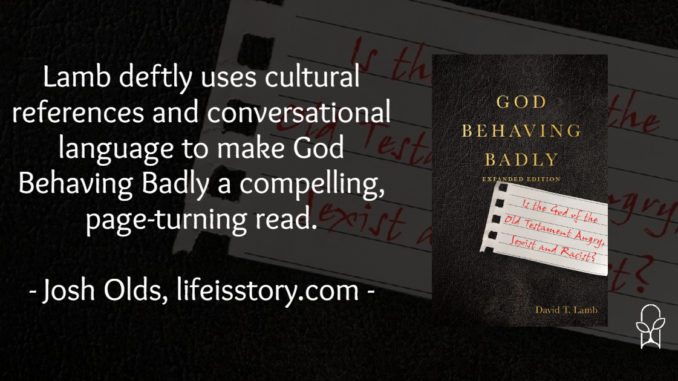
Also by this author: The Emotions of God: Making Sense of a God Who Hates, Weeps, and Loves
Published by IVP on January 4, 2022
Genres: Non-Fiction, Apologetics
Buy on Amazon
Goodreads

God has a bad reputation. Many think of God as wrathful and angry, smiting people right and left for no apparent reason. The Old Testament in particular seems at times to portray God as capricious and malevolent, wiping out armies and nations, punishing enemies with extreme prejudice. But wait. The story is more complicated than that. Alongside troubling passages of God's punishment and judgment are pictures of God's love, forgiveness, goodness, and slowness to anger. How do we make sense of the seeming contradiction? Can God be trusted or not? David Lamb unpacks the complexity of the Old Testament to explore the character of God. He provides historical and cultural background to shed light on problematic passages and bring underlying themes to the fore. Without minimizing the sometimes harsh realities of the biblical record, Lamb assembles an overall portrait that gives coherence to our understanding of God in both the Old and New Testaments. This expanded edition includes an updated preface, afterword, and appendix addressing the story of Noah and the flood.
“The God of the Old Testament is arguably the most unpleasant character in all fiction: jealous and proud of it; a petty, unjust, unforgiving control-freak; a vindictive, bloodthirsty ethnic cleanser; a misogynistic, homophobic, racist, infanticidal, genocidal, filicidal, pestilential, megalomaniacal, sadomasochistic, capriciously malevolent bully.” – The God Delusion, Richard Dawkins
Anyone who reads the Old Testament has to grapple with the subject sooner or later. Why is God portrayed like this? You may not come to the hyperbolic extremes of Dawkin’s conclusion, but a plain reading of the Old Testament will leave you wondering. Is the God of the Old Testament angry, sexist, and racist? Old Testament scholar David T. Lamb attempts to answer that question in God Behaving Badly. This is an expanded edition, based on the 2011 original, and while the overall thesis of Lamb’s answers are retained, this edition has more nuance and is written with the major cultural upheavals of the last decade in mind. After a chapter of introduction, Lamb takes readers through seven different types of competing attributes:
- Angry or Loving?
- Sexist or Affirming?
- Racist or Hospitable?
- Violent or Peaceful?
- Legalistic or Gracious?
- Rigid or Flexible?
- Distant or Near?
New to this edition is a chapter in the appendix that specifically discusses Noah’s flood and all the ethical/moral implications of God’s great reset of humanity in Genesis 6–8. While I appreciate that addition (why do we decorate church nurseries with Flood imagery???), what I appreciate more is that the rest of the book doesn’t take the style of examining a narrative but examining a theme. That thematic overview gives God Behaving Badly the feeling of a blanket, covering over broad swaths of the narrative, rather than narrowly trying to cover specific texts.
I also appreciate that while Lamb digs deeply into the Old Testament and its historical/cultural background, he also brings contemporary application and cultural relevance. You might think that reading commentary on ancient texts would be dry and boring (and those books do exist!), but Lamb deftly uses cultural references and conversational language to make God Behaving Badly a compelling, page-turning read. Lamb is just as likely to quote an academic commentary as he is Calvin and Hobbes and that makes things easier and more fun for everyone.
That does mean that some of the answers Lamb gives aren’t as academic rigorous as it might be if he was addressing a different audience. There were times where I wished an answer was a little deeper or held a little more nuance or addressed some obvious follow-up question (or at least one I thought was obvious). But the tone, the specificity, and the content are perfect for the audience God Behaving Badly is trying to attract.
I’ve read a lot of these OT apologetics and this is the strongest one that I’ve found. Lamb is clear that tensions still exist, that answers aren’t clear or easy, that sometimes we must simply sit in the tension. But where there is clarity, he offers some. Where there are insights, he provides abundantly. Most importantly, he offers a way of interpreting the Old Testament so that it has relevance for readers today. More than just an ancient text from an irrelevant covenant, the OT has a lot to say about what a God-structured community looks like and how God-followers are to act when in power. As such, God Behaving Badly holds great relevance for readers today, not just to defend God’s integrity (as if God needed apologists), but as a way of guiding readers into experiencing and living out God’s goodness.
